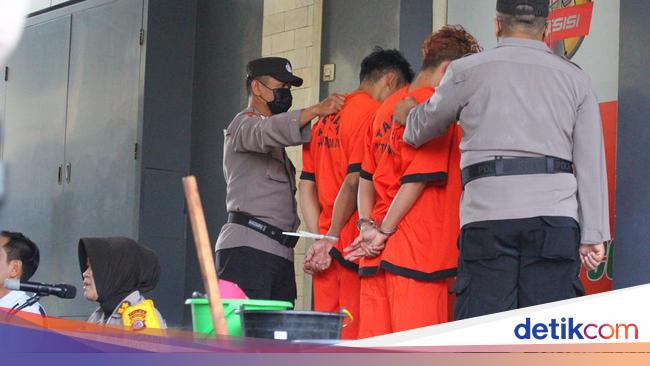Jakarta –
After graduating from university, Palath Dilokloethanakorn, who was 22 at the time, followed the tradition most other young Thais do before starting their career, namely joining a Buddhist monastery.
“It felt like a tradition that I had to do for my parents, especially as their eldest son,” he told the DW team, adding that his parents were overjoyed the day he was ordained.
Palath spent a month at the temple, shortly after his graduation ceremony. In Thailand, this is seen as a rite of passage. Many other men also choose to enter the temple after graduating from college, when they have yet to find a job and have some free time.
“It is a way of showing gratitude (to the family) for raising them, as it is believed that ordination can bring great merit to your parents,” said Uthit Siriwan, a Thai Buddhist scholar.
Monastic life
Men who decide to respect this tradition must stay in monasteries, shave their hair and eyebrows, and walk barefoot through the streets at dawn in bright orange robes, to receive food offerings from the local community.
Monks who follow Theravada, the predominant Buddhist tradition in Thailand, cannot cook for themselves. They could only eat the food that had been given to them.
It’s just one of the 227 strict rules of conduct that frame a monk’s life. Other rules include abstaining from sexual intercourse and also not handling money.
“Those who have been ordained have trained themselves physically and mentally to have a better sense of discipline, responsibility and awareness than those who have not,” Uthit told the DW team.
Become a monk to ‘refresh the mind’
Palath admits that his time as a monk at a young age was mostly spent helping out around the temple, rather than focusing on Buddhist teachings.
That eventually led to Palath re-entering to become a monk for a second time when he was 35, a decision most Thais consider unusual. But as it turned out, returning to the monastery had its perks.
“Many see ordination as one of the big agendas in life that should only happen once, but that value is fading,” explained Uthit.
Meanwhile, there is no specific timeframe for ordination, it could be as short as one day or even as long as months.
“Today, being ordained multiple times is like taking a course to strengthen and refresh the mind, and get encouragement and inspiration,” added Uthit.
The feeling of having the opportunity to enrich oneself spiritually is also one of the reasons Nattapong Chaosangket, 29, started his monastic life.
For a boy of his age, becoming a monk may sound too late for most people in Thailand, where men are usually ordained as young as 20 and before they marry. However, Nattapong said he was a “troublesome child” as a teenager, before he became a father.
“If I had done it earlier, I probably would have just been on my phone all day and wouldn’t have learned anything,” Nattapong told the DW team.
Seeking atonement or trying to hide?
Not everyone who enters the monastic life does so to please their parents or for spiritual reasons. Some others do it to show moral responsibility and make amends for them.
Last month in Bangkok, after a school fire drill went awry that killed a student, three firefighters involved were temporarily ordained as a sign of regret over the incident.
While the firefighters expressed remorse, Uthit revealed that some others took cover under monk robes and used their status to protect themselves from the consequences of their actions.
“Thai people regard monasteries as places of forgiveness,” Uthit said, adding that by staying at monasteries, those who commit mistakes will be forgiven by society.
In a country where more than 90% of Thai people follow Buddhism, monks in the Southeast Asian country are highly respected.
However, public sentiment was not always in their favour. There are still many Thai people who question whether they really feel sorry and want to make up for their mistakes, or not.
In 2022, for example, after a policeman who ran over and killed a doctor on his motorcycle was ordained, many criticized the move as a cynical ploy to win back public sympathy.
What about children and women?
Although becoming a full-fledged monk in Thailand is only reserved for males over the age of 20, boys under that age can be ordained as novices. Many schools in Thailand often hold mass ordination ceremonies, at the start of each summer vacation.
Although most children are not very keen, 11-year-old Kittiwat Penpato has participated and plans to return every year, to follow the example of his monk uncle.
“The school only arranged for him for nine days this year, but my son is staying at the temple until the start of the new term,” Kancharat Kotsri, mother of Kittiwat, told the DW team, adding that his son plans to become a full-time monk when he grows up. Later.
On the other hand, Thai women face quite an uphill struggle because they are not allowed to ordain as monks in the country. Although becoming a nun is fully possible in other countries such as South Korea, China, and Vietnam, Thailand does not recognize female monks or female novices.
As an alternative, some devout Buddhist women choose to become maechi or white-robed nuns, where the rules are less strict.
(kp/ha)
See also ‘Reasons for Pita Limjaroenrat Not Becoming PM of Thailand Despite Winning the Election’:
(it/it)
2023-07-28 06:59:27
#Thai #men #temporary #monks


